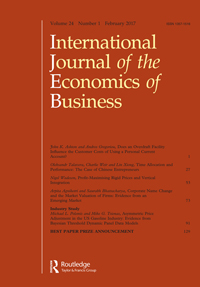Financial System Adaptability and Resilience
Financial Systems differ between countries. Their configuration is sticky and does not change suddenly. A well-functioning financial system is essential for economic development by efficiently allocating capital to the highest net present value projects.
However, the resilience of financial systems is frequently challenged. For example, the Great Financial Crisis of 2007/08 was a large blow from within the system: New financial instruments fuelled a credit bubble in the United States' housing markets, which almost brought down the global financial system when it eventually burst. The crisis triggered hefty government interventions and regulatory actions to make financial systems more resilient.
More frequently, challenges like the Covid-19 pandemic, the climate crisis and the green transition of economies, and the energy crisis triggered by the war in Ukraine, again highlight the crucial importance of resilient financial systems that adapt themselves and facilitate adequate responses to shocks of the real economy alike.
The research group “Financial System Adaptability and Resilience” investigates three critical aspects of financial system adaptability and resilience. First, it uses the occurrence of major natural disasters in the United States and Germany to analyse the impact of these events on financial systems. Natural disasters are becoming more frequent and more severe because of climate change. Therefore, evidence about the role of banks in providing funding to spur economic recovery is critical.
Investigations across different configurations of financial systems, such as bank- vs. market-based economies (e. g., Germany vs. the United States), allow for highlighting which components of financial systems seem better equipped to increase financial systems resiliency.
Second, the climate crisis requires economies to transform production technologies in order to source sustainable and renewable energy inputs. By using micro-data on German plants and their headquarters' banking relationships and information about the local and federal state leading political parties in Germany, the group aims to investigate the effects of political preferences for the green transition. This group's research will thereby enhance our understanding how climate policies balance the necessary need to reduce emissions with the economic burden imposed on agents during any large-scale transition of societies.
Third, the group's research analyses the role of culture in economies. The idea is that various aspects of culture, like religion, can work as a device that holds societies together and facilitate economic transactions. Using well-established empirical laboratories coming from significant natural disasters (for example, Hurricane Katrina in 2005), the group investigates whether local economies with a higher cultural imprint coming from religion found it easier to recover faster. Other incidents for which culture can play a vital role are big corporate scandals.
Using the Volkswagen Scandal from 2015, research by this group analyses the essential role of cultural imprints for consumer reactions in responding to large corporate scandals. This is important since government and regulatory intervention tend to come late or insufficient to punish corporate wrongdoings.
Workpackage 1: Development of Financial Systems after Significant Natural Disasters
Workpackage 2: Financial Systems' Role in the Economies' Green Transition
Workpackage 3: Cultural Aspects within Financial Systems
Research Cluster
Financial Resilience and RegulationYour contact

- Department Financial Markets
EXTERNAL FUNDING
08.2022 ‐ 07.2025
OVERHANG: Debt overhang and green investments - the role of banks in climate-friendly management of emission-intensive fixed assets
The collaborative project “Debt Overhang and Green Investments” (OVERHANG) aims to investigate the role of banks in the climate-friendly management of emission-intensive fixed assets. This will identify policy-relevant insights on financial regulation, government-controlled lending and financial stability, as well as raise awareness among indebted stakeholders.
01.2015 ‐ 12.2019
Interactions between Bank-specific Risk and Macroeconomic Performance
07.2016 ‐ 12.2018
Relationship Lenders and Unorthodox Monetary Policy: Investment, Employment, and Resource Reallocation Effects
Leibniz Association
We combine a number of unique and proprietary data sources to measure the impact of relationship lenders and unconventional monetary policy during and after the European sovereign debt crisis on the real economy. Establishing systematic links between different research data centers (Forschungsdatenzentren, FDZ) and central banks with detailed micro-level information on both financial and real activity is the stand-alone proposition of our proposal. The main objective is to permit the identification of causal effects, or their absence, regarding which policies were conducive to mitigate financial shocks and stimulate real economic activities, such as employment, investment, or the closure of plants.
Refereed Publications

Bank-Firm Relationships and International Banking Markets
in: International Journal of the Economics of Business, No. 3, 2002
Abstract
This paper reviews how long-term relationships between firms and banks shape the structure and integration of banking markets worldwide. Bank relationships arise to span informational asymmetries that are endemic in financial markets. Firm-bank relationships not only entail specific benefits and costs for both the engaged firms and banks, but also directly affect the structure of banking markets. In particular, the sunk cost of screening and monitoring activities and the 'informational capital' collected by the incumbent banks may act as a barrier to entry. The intensity of the existing firm-bank relationships will determine the height of this barrier and shape the structure of international banking markets. For example, in Scandinavia where firms maintain few and strong relationships, foreign banks may only be able to enter successfully through mergers and acquisitions. On the other hand, Southern European firms maintain many bank relationships. Therefore, banks may consider entering Southern European banking markets through direct investment.

Attribute Dependence and the Provision of Quality
in: Regional Science and Urban Economics, No. 5, 2001
Abstract
Often a quality improvement necessitates modifications of varietal product features. This paper studies firms’ incentives to provide quality when this decision affects the goods’ degree of perceived horizontal differentiation. We find that the quality level hinges crucially on the interaction between the quality and the varietal product attribute. We examine the outcome of a game where firms decide on quality and price relative to what a social planner would desire. If the interaction between quality and perceived horizontal differentiation is sufficiently positive, we find for the sequential game ‘quality then price’ that the private incentives to provide quality are excessive relative to the social optimum. As a result the level and the direction of interaction between the attributes determines whether there is excessive or insufficient provision of quality.

On the Incentives to Provide Fuel-Efficient Automobiles
in: Journal of Economics, No. 2, 2001
Abstract
We argue that the provision of more fuel-efficient cars necessitates specific aerodynamic shapes. We show that the presence of this technological constraint may reduce the incentives to provide fuel efficiency. In equilibrium, cars become more similar and aerodynamic as fuel prices increase. However, the provided level of fuel efficiency falls short of the social optimal one such that a fuel-economy standard is welfare-enhancing.

Bank Relationships and Firm Profitability
in: Financial Management, No. 1, 2001
Abstract
This paper examines how bank relationships affect firm performance. An empirical implication of recent theoretical models is that firms maintaining multiple bank relationships are less profitable than their single-bank peers. We investigate this empirical implication using a data set containing virtually all Norwegian publicly listed firms for the period 1979-1995. We find that profitability is substantially higher if firms maintain only a single bank relationship. We also find that firms replacing a single bank relationship are on average smaller and younger than firms not replacing a single bank relationship.

Price Competition between an Expert and a Non-Expert
in: International Journal of Industrial Organization, No. 6, 2000
Abstract
This paper characterizes price competition between an expert and a non-expert. In contrast with the expert, the non-expert's repair technology is not always successful. Consumers visit the expert after experiencing an unsuccessful match at the non-expert. This re-entry affects the behavior of both sellers. For low enough probability of successful repair at the non-expert, all consumers first visit the non-expert, and a 'timid-pricing' equilibrium results. If the non-expert's repair technology performs well enough, it pays for some consumers to disregard the non-expert a visit. They directly go to the expert's shop, and an 'aggressive-pricing' equilibrium pops up. For intermediate values of the non-expert's successful repair a 'mixed-pricing' equilibrium emerges where the expert randomizes over the monopoly price and some lower price.
Working Papers

Corporate Governance Structures and Financial Constraints in Multinational Enterprises – An Analysis in Selected European Transition Economies on the Basis of the IWH FDI Micro Database 2013 –
in: IWH Discussion Papers, No. 3, 2015
Abstract
In our analysis, we consider the distribution of decision power over financing and investment between MNEs’ headquarters and foreign subsidiaries and its influence on the foreign affiliates’ financial restrictions. Our research results show that headquarters of multinational enterprises have not (yet) moved much decision power to their foreign subsidiaries at all. We use data from the IWH FDI Micro Database which contains information on corporate governance structures and financial restrictions of 609 enterprises with a foreign investor in Hungary, Poland, the Czech Republic, Slovakia, Romania and East Germany. We match data from Bureau van Dijk’s AMADEUS database on financial characteristics. We find that a high concentration of decision power within the MNE’s headquarter implicates high financial restrictions within the subsidiary. Square term results show, however, that the effect of financial constraints within the subsidiary decreases and finally turns insignificant when decision power moves from headquarter to subsidiary. Thus, economic policy should encourage foreign investors in the case of foreign acquisition of local enterprises to leave decision power within the enterprise and in the case of Greenfield investment to provide the newly established subsidiaries with as much power over corporate governance structures as possible.



















